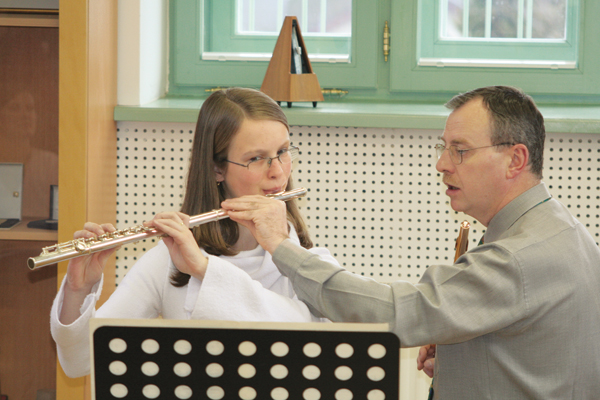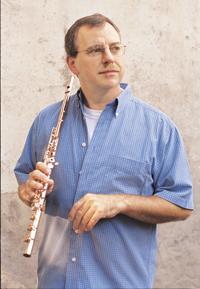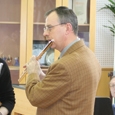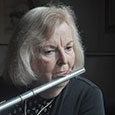
Bálint graduated from the Franz Liszt Academy of Music of Budapest in 1984. From 1981-1991 he was solo flutist of the Hungarian Radio Symphony. With the help of the Georges Cziffra Foundation his international career was launched in 1986. From 2000-2007 he was the solo flutist of the Hungarian National Philharmonic Orchestra. János Bálint is the flute professor at the Musik Hochshule in Detmold, Germany and a supervisor professor at the Music Academy of Kragujevac in Serbia. He is active as a soloist and masterclass professor throughout the world.
What teachers and flutists influenced your playing and teaching?
My first four flute professors were clarinet players. At the beginning we played table tennis more often than the flute at lessons. My next more serious flute professor was a lawyer who refused to collaborate with the communist leaders during the communist regime. He resigned from his position and played solo piccolo in the theatre and started teaching the flute. I admired him and am the most grateful for him.
My playing was strongly influenced by Jean-Pierre Rampal, and my teaching by Aurele Nicolet. During the cold war Hungary was behind the iron curtain which made it very difficult for me to travel and attend masterclasses. I was well over 30 years old when I met them personally.
Before I met Nicolet, many flutists asked if I were a student of Nicolet. When I met him for the first time, I told him this and asked if he would give me a lesson so I could say I had indeed studied with Nicolet. He laughed and said, “Ok, you can come. We can play duos a little bit and drink some wine, but forget the lesson as you do not need it.” I think it was the biggest compliment I have ever received.
Which etude composers did you study?
In the first years of study I learned over 800 etudes including Gariboldi, Moyse (10 Books), Platonov, Jeney, Wehner, Eördögh, Köhler, Andersen, Selected studies of Tomaszewski (5 books containing 200 selected studies), and Taffanel-Gaubert. I am planning to write a methodological book on flute playing and musicianship one day.
What were your first experiences as a professional musician?
I began my career as an orchestral musician when I was 20 when I won the solo flutist position with the Hungarian Radio Orchestra. At the time I was a third level student at the Franz Liszt Music Academy of Budapest, Hungary. Since I was so young, it was a big challenge for me and difficult at times, but I was able to perform with great conductors such as Matacic, Simonov, Rozdietvenskiy, Patane, and Solti. The concerts of the Hungarian Radio Symphony have a live broadcast and are also public concerts.
My teaching career began in 1984 when Michel Debost asked me to be his teaching assistant for his masterclass in Assisi, Italy. Earlier in the year I had entered the Ancona, Italy International Woodwind Competition. My woodwind quintet won the first prize, then I won as the top flute player, and finally in the final competition composed of all first place winners, I became the Vincitore assoluto or absolute winner. As a result, I was offered to play a concert in Assissi at their summer festival Amor. Debost heard this concert, and my teaching career began.
Who do you teach at the Hochshule fuer Musik (Detmold)?
Currently my students are all from Europe; however, in the past I have had many international students, including flutists from South America, the United States and Asia. Luckily, study at the Hochschule for Musik in Detmold is tuition free.
Flutists either study at the orchestra center with studies for those who want to be orchestral musicians or enter the soloist class for those who would like a solo career. At the orchestra center, flutists focus on audition training, mental concentration, sectional rehearsals, and orchestral performance besides flute lessons.
Flutists studying to become a soloist only have flute lessons. As part of the curriculum they take part in international flute competitions. They do not have to write a diploma thesis, but do play a diploma concert.
At the moment I have 12 students; most of whom would like to play in an orchestra. In Germany there are about 130-140 orchestras so there will be employment possibilities for them in the future.
Flutists receive a 90-minute per week private lesson and a 30-minute per week private lesson on playing the piccolo and orchestral excerpts. Once a month in the evening, we have a seminar in a masterclass format where we analyze one of the great masterpieces for flute and discuss performance and pedagogical issues. At my school I am the only professor who teaches such a class, but I think it is important to do so.
My curriculum for first-year students is to help them develop a strong foundation in basic musicianship and in playing the flute. I try to correct any weaknesses they may have. With my masters students I work on the stabilization of everything technically and musically, and for doctoral students the concentration is on fine tuning interpretation, stage presence, and helping them find their individual voice.
 What is your concept of sound?
What is your concept of sound?
For me, there are seven basic characteristics to consider when making a sound. Sound should be natural and balanced (homogeneous) in all three octaves. It should work throughout a wide dynamic range and have the correct intonation. Sound should work for every type of articulation with no changes in sound quality, and finally, it should have a lot of colors and be expressive.
How do you teach students to develop an excellent articulation?
It may seem strange to say, but articulation is determined by the position of the tongue in the legato. The tongue has to be kept behind the teeth without tension, and it must not disturb the way of the air.
What are the biggest problems you hear in students’ phrasing?
I think the biggest problem occurs when a flutist has not learned the difference between Classic and Romanic styles. They often play a mixture of the two. Another problem I hear is playing without attention to dynamics. In their early stages of development not playing dynamics may be a technical issue, but later it is a question of temperament.
How do you guide students through the competition process?
Not every student should enter competitions. I only send students to a competition if they possess strong musical and technical groundings. The student should also be the competitor type. At first I have students start at smaller competitions where the competition repertoire is simpler.
If the competition rules allows for the flutist to choose the repertoire, we always choose material that is best suited to the strengths of the flutist. We select pieces that will not become boring during the preparation process. We never choose an extreme style or way to play any piece in the repertoire.
Preparation for any big competitions begins five or six months in advance. During the preparations we follow a schedule alternating five weeks of intensive work followed by one week of relaxed work. Relaxed work means playing what the student likes. Before any big competition flutists should perform the competition repertoire in at least three or four public concerts.
Since you play 50 to 60 concerts annually, which concertos do you prefer to perform?
I enjoy the concertos by Mozart, Bach, and my transcription of Mendelssohn’s early violin concerto in D minor. I performed this concerto on the National Flute Association’s Gala Concert: Orchestra Night on August 10, 2013 in New Orleans with Ransom Wilson conducting. Playing chamber music with other good musicians is always a pleasure too.
Have you made other transcriptions for flute?
I have made about 20 transcriptions. At the early stages in developing my career, I did not want to copy others’ repertoire, so I began making transcriptions. I think this experience helped me improve musically. I was also in demand because I played a different repertoire from everyone else.
What are your future plans?
I would like to continue playing as many concerts as possible. About 25 years ago, I transcribed the Paganini Violin Concerto for flute and orchestra and recorded it in 1991. Now I would like to publish the work. Other plans include making a CD and writing a book about playing the flute.
* * *
Personal Life
My father was a doctor and my mother taught mathematics and chemistry. Neither were musicians. I am married, and we have three children. My wife, Rozalia, is a high school teacher. Our son, age 26, is a university student studying choir conducting. Our older daughter, age 16, is a guitar student at the best conservatory in Budapest, and our younger daughter, age 9, plays the cello and studies ballet.
We live in downtown Budapest, but we have a holiday home at Lake Balaton where we renovated an old, big peasant home. The former stable was converted into a concert hall. In the summer we invite our musician friends and most talented students for a holiday. While they are visiting, we give three or four free concerts for the local residents. Needless to say, they love the concerts and don’t want to leave afterwards.
I love playing football, watching sports and sailing. As a 14-year old boy, I wanted to be a professional football player, but my parents were opposed to this. I was also a very good swimmer, swam 10 kilometers every day, and was a prize-winner at a national swimming championship. I also like to read especially anything to do with history and geography.
Teaching
.jpg)
János Bálint has taught masterclasses in Finland, Austria, England, Italy, Luxembourg, Germany, Japan, Taiwan, Korea, Switzerland, France, Poland, and most other European countries. He also has served as a juror at most of the important international music competitions in the USA, Japan, Italy, Poland, Serbia, Slovenia, Austria, Hungary, Germany, and France. Students from his private and university studio who have won competitions are listed below.
Prizewinning students:
1992 Altamura Mercadante Competition: 1st prize Sutyinszky Beáta, 2nd prize Embey-Isztin Zsófia
1993 Riva del Garda Syrinx Competition: 1st prize not awarded, 2nd prize Sutyinszky Beáta
1994 Roma Valentino Bucchi Competition: 1st prize not awarded, 3rd prize Embey-Isztin Zsófia, Special prize Kunszeri Márta
1996 Prague International Music Competition: 3rd prize Kramarics Katalin
1997 Viggiano Lorenzo Competition: 1st prize Kramarics Katalin
1997 Roma Syrinx Competition: 1st prize Varga Fruzsina
1997 Paris Chamber Music Competition: 1st prize Quintett
1998 Paris Rampal Competition: 1st prize not awarded, 2nd prize Szabó Rozália, Special prize Kramarics Katalin
1998 Trapani Chamber Music Competition: 1st prize not awarded, 3rd prize Quintett
1998 Tokyo Flute Competition: 3rd prize Tohko Iwase
2002 Krakow –International Flute Competition: 1st prize Katalin Kramarics
2003 Napoli – International Young Flutist Competition: 3rd prize Michela Caser
2004 Krakow – International Flute Competition: 4th Prize Izabella Czajkowska, 5th Prize Vera Lang, 6th Prize Maiko Ichiguro
2005 Beograd – Konjovic Young Flutist Competition: 1st Prize Jagoda Sudujko
2007 Kuhlau International Flute Competition: 2nd Prize Duo Category: Katrien Lissens-Tobias Flügel
2008 Krakow – International Flute Competition: 2nd Prize Anita Farkas
2009 Bonn – Deutsche Musikrath Wettbewerb: Finalist Anna Klie
2009 Dabrowa Gornicza – International Flute Competition: 2nd Prize Gabriele Bertolini, 3rd Prize Yi-Hsien Liao
2009 Novi Sad – Eberst International Flute Competition: 1st Prize Lívia Duleba, 2nd Prize Gabriele Bertolini, 3rd Prize Márfi Eszter
2010 Wuppertal– Chamber Music Competition: 2nd Prize Gabriele Bertolini
2010 Wroclaw –Polish National Flute Competition: 1st Prize Wioletta Straczek
2010 ARD International Flute Competition: Semifinalist Lívia Duleba +Tímea Acsai
2011 Krakow – International Flute Competition: 4th Prize Lívia Duleba, 6th Prize Wioletta Straczek
2011 “Förderpreis Musik” der Gesellschaft zur Förderung der Westfälischen Kulturarbe Münster: Anita Farkas
Bálint’s Recordings
Capriccio Label (Germany)
10498 Historie du Tango flute and guitar
10735 Carulli: Double concerto
10530 Salieri: Double concerto
10584 Holst: Fugal Concerto
10505 Barber: Capricorn Concerto
10757 Original transcriptions for flute and guitar
10509 J. Chr. Bach: Sinfonie concertanti Vol. 1-4
10748 Miniaturs for flute and harp
10831 Carnevale di Venezia (flutes and chamber orchestra)
Hungaroton Label (Hungary)
31481 Mendelssohn violin concertos (flute version)
31661 Vivaldi: Four seasons
Paganini : B-minor concerto (flute version)
31671 Madarász Iván: Concerto in F
32051 Flute Pearls
32280 Dvorák: Sonatina in G major
Schubert: Introduction and Variations on “Trocken Blumen”
Cesar Frank: Sonata in A major for flute and piano






